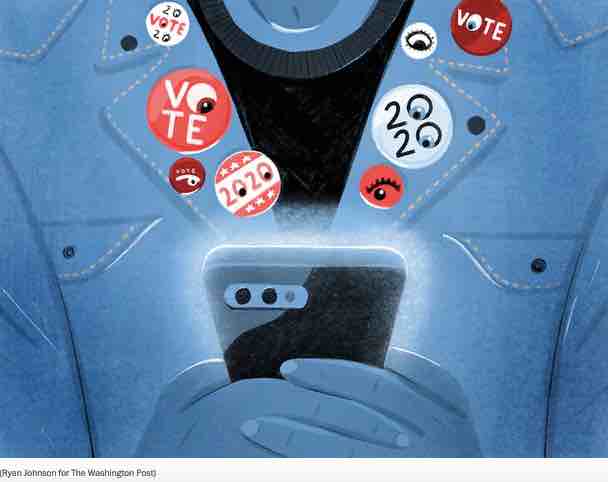. . . I’ve been on a crusade to find out what politicians know about me. So over the past few months, I’ve used California’s new data privacy law to force companies that specialize in collecting my personal information for campaigns to show me the data.
What I learned: Privacy may be a cornerstone of American liberty, but politicians on both sides of the aisle have zero problem invading it.
In fiercely competitive races, campaigns see our data as their edge. The Republican National Committee proudly told me it now has more than 3,000 data points on every voter. The Democratic National Committee said it acquires enough to understand you as a person, including unique identifiers from your phone that can be used to target ads across different apps.
Politicians have long had special access to voter registration and participation data, which they use to plot strategy, run polls and coordinate volunteers. But in recent years, they’ve also begun tapping into commercial data brokers and murkier social media and smartphone tracking techniques. The scandal that erupted around Cambridge Analytica, which scraped data from Facebook while working for Donald Trump’s 2016 campaign, was just the tip of the iceberg.AD
Many Americans, like me, find targeted ads creepy when they come from businesses, especially when they use personal data we didn’t really consent to have tracked. But I found it downright unsettling to learn that my credit score — and so much else — was going to politicians who could use it to try to manipulate me. Online political ads are so potentially dangerous for democracy that Twitter banned them entirely and Google limited how campaigns can target them. (In September, Britain’s Channel 4 documented how Cambridge Analytica used voter data to specifically disenfranchise African American voters in 2016.)
I’m not saying politicians are breaking any laws; I’m saying there just aren’t many laws designed to protect our data from politicians. As an institution, Congress has shown little interest in regulating the digital tools its members use to get into office. (Even the California Consumer Privacy Act I used in my quest applies only to the for-profit part of this economy.) Citizens with a lot of free time can try to opt out of some political databases and communications, but for the most part, we have little control.
In my data crusade, I should have been an enigma for the politicians. As a journalist, I don’t donate, sign petitions or participate in surveys. I also avoid campaign communications, though I recently signed up for text messages from both the Trump and Biden campaigns as part of this reporting.AD
It turns out campaigns didn’t need me to volunteer information to build detailed profiles about me. I found five major sources of personal data that fuel the political machine.




